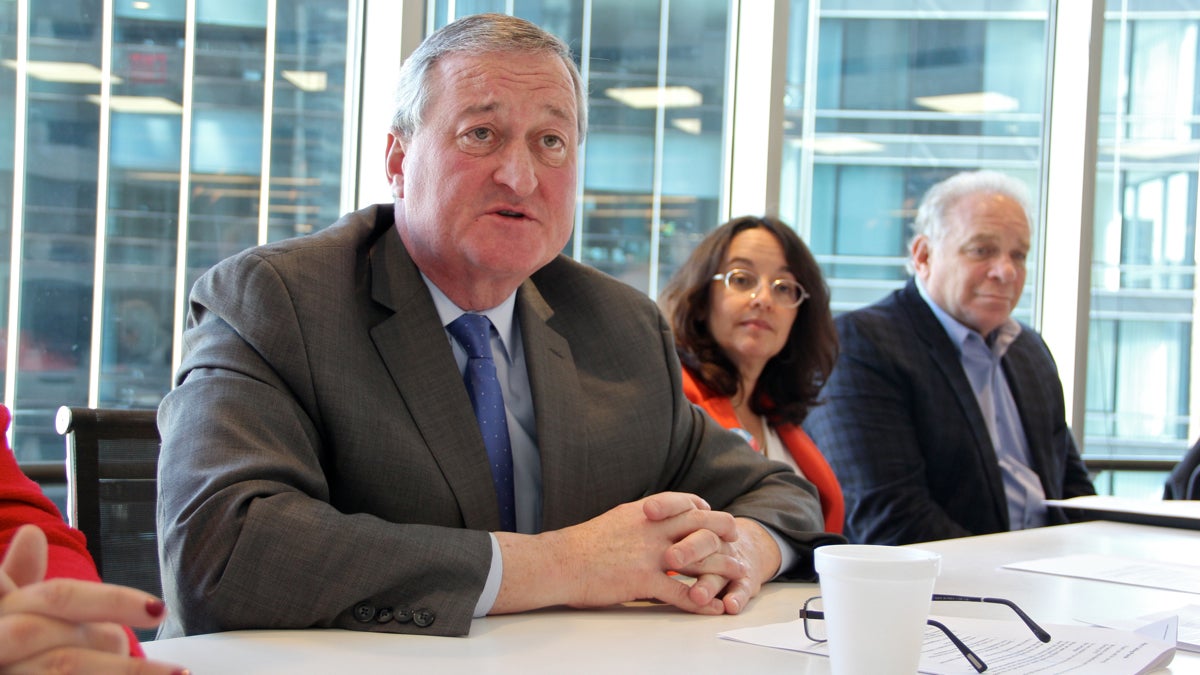Kenney releases ‘ethical, accessible and transparent government’ policy paper

Mayoral candidate Jim Kenney discusses his ethics policy paper at a Monday afternoon press conference. (Emma Lee/WHYY)
Flanked by members of his campaign’s policy team in a 15th-floor conference room overlooking City Hall’s southwestern side, mayoral candidate Jim Kenney released a government-ethics policy paper on Monday afternoon.
“This is the first step in imagining what the Kenney Administration is going to be like,” said Kenney of the first policy paper he’s released in a field that has seen other candidates release similar reports on an array of topics. “These points that I’ve hit … are going to be important right off the bat, January 2016.”
Among the topics covered in the 11-page release (PDF) are “Strengthening Ethics Policies” (examples: issue executive orders for an independent inspector general and chief integrity officer and disclose ties with non-profit organizations), “Driving Down Pay-to-Play” (publicly financed municipal elections), “Building an Accessible and Transparent 21st Century Government” (implement zero-based budgeting, increasing access to data and public records) and “Investing in Technology” (increasing broadband access).
He lauded Mayor Michael Nutter’s legacy-defining work in the ethics arena, making moves that required a “cultural change for government to go through” in Philadelphia.
“I don’t want anybody to have any fear going forward in 2016 that anything is going backwards on ethics. We’re going to do an even better job that the already great job than the Nutter Administration has done,” said Kenney, after being introduced by policy members Alba Martinez and Ellen Mattleman Kaplan.
“We’re going forward to expand [initiatives] and to close some of these loopholes and little niches that have come about as a result of having to write legislation that’s not always perfect,” he said.
On taxes and ‘dark money’
One portion of the policy paper that played directly into campaign activities was Kenney’s call to “disclose independent spenders” á la Citizens United-fueled anonymous campaign donors.
Earlier this month, candidate Lynne Abraham challenged her opponents to sign a “‘people’s pledge’ rejecting independent expenditure groups.” When Kenney was asked for his reaction, he took a shot at the candidate viewed as potentially costing him votes on May 19.
“I think she ought to release all her tax returns first before she condemns anything,” Kenney said, returning to an issue that arose two weeks ago. “If there’s nothing wrong with the tax return, release it and dispel any notion that people think you’re trying to hide something.”
Then, he spoke about the difficulty of actually grappling with that so-called “dark money.”
“I am not a member of the United States Supreme Court, and I did not vote or write an opinion based on Citizens United,” he said. “It is unfortunate that the Citizens United opinion has circumvented campaign-finance reforms in the city.
“I can’t control it one way or the other. You can’t stop somebody from putting a campaign commercial on television; you can’t physically restrain them. I’d rather this situation didn’t exist, but it exists … and it’s something we need to address legislatively by requiring them, like New York City does, to at least divulge who they are.”
But would he sign off on Abraham’s pledge if she released all the tax returns that she’s withheld thus far?
“We don’t have the capacity to ban ‘dark money.’ It’s the United States Supreme Court that said they’re allowed to do it, and they’re doing it,” he told NinetyNine.
“If you can get me some idea of how I can stop them from doing it other than turning off everyone’s televisions, I don’t know what it is I can do,” he continued. “Am I glad it exists? No. But it exists, and I didn’t create the situation. I assume I’m going to see something negative about me that I won’t like coming from one of those IEs. But, that’s life until the Supreme Court changes a ruling.”
WHYY is your source for fact-based, in-depth journalism and information. As a nonprofit organization, we rely on financial support from readers like you. Please give today.




